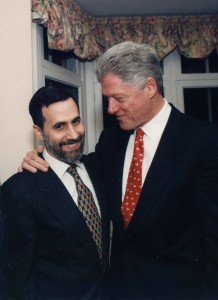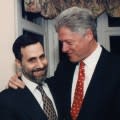 When his Republican opponents accused President Bill Clinton of flip-flopping between political positions he found solace in an unlikely place. It was a dvar Torah sent to him by Rabbi Menachem Genack, the CEO of the Orthodox Union’s Kosher Division and the rabbi of Congregation Shomrei Emunah in Englewood, NJ.
When his Republican opponents accused President Bill Clinton of flip-flopping between political positions he found solace in an unlikely place. It was a dvar Torah sent to him by Rabbi Menachem Genack, the CEO of the Orthodox Union’s Kosher Division and the rabbi of Congregation Shomrei Emunah in Englewood, NJ.
In the note, Rabbi Genack laid out Rabbi Joseph Soloveitchik’s opinion on why the royal line of the Jewish people descended from Judah instead of Joseph. Rabbi Genack stated that Judah’s name stems from the word ‘admit’ and referred to the Biblical story of Tamar in Genesis 28, when Judah admits that he is the father of Tamar’s child.
“The critical element of leadership is the capacity to admit a mistake and not be wedded to a misguided and possibly disastrous course…” Rabbi Genack wrote to the president. “It is ironic that President Clinton is often assaulted by his Republican critics for waffling and changing policy when his ability to adjust to new circumstances and political reality, while remaining true to his basic vision, is the mark of real leadership.”
Clinton responded with a handwritten note explaining how much he loved the missive, and also nonchalantly mentioned that the story of Tamar and Judah occurs in Genesis 38, not 28. (As it turns out, a typist had gotten the chapter number wrong.)
“Bill Clinton has a tremendous amount of information on the Bible, not only as literature, but also as inspiration,” explained Rabbi Genack as he sat in his office in downtown Manhattan with a clear view of the Statue of Liberty. “The book is a testament to President Clinton’s openness and his extraordinary intellectual curiosity.”
The exchange was part of “Letters to President Clinton: Biblical Lessons on Faith and Leadership,” a collection of 100 letters that Rabbi Genack wrote and curated to the former president over a 20-year period, published by Sterling Press in October. The two met in 1992 when Rabbi Genack was called to introduce the then-Arkansas governor at a fundraiser in New Jersey. Rabbi Genack quoted Proverbs, “Where there is no vision, the people perish,” and spoke about how vision is an essential ingredient of leadership in an allusion to then-President Bush’s own remark about his difficulty with the “vision thing.”
Clinton liked the quote so much that he used it as a rhetorical focal point in his acceptance speech for the Democratic nomination several months later. From that moment, an unlikely friendship blossomed between the two, with Rabbi Genack mailing and eventually emailing to Clinton missives on a variety of different topics, both while Clinton was in office and afterward.
Rabbi Genack also recruited other writers to contribute, including former Chief Rabbi of the United Kingdom Rabbi Jonathan Sacks; Rabbi Dr. Norman Lamm, the former chancellor of Yeshiva University; former Senator Joseph Lieberman, author Cynthia Ozick, Rabbi Adin Steinsaltz, and Raold Hoffman, a Nobel Laureate in Chemistry The letters offer brief and incisive lessons on a variety of topics by some of today’s great Jewish thinkers.
The letters also showcase Rabbi Genack’s impressive erudition about another president: Abraham Lincoln. Photographs and paintings of three figures dominate the walls of Rabbi Genack’s 12th floor office: his mentor, the Rav, Rabbi Joseph B. Soloveitchik; his hero, President Abraham Lincoln; and his friend, President Bill Clinton.
“I often tell my children that if they want to read a volume of mussar — a book about ethical and proper behavior — they should read a biography of Lincoln,” Rabbi Genack wrote in one of the letters to Clinton.
Rabbi Genack shied away from comparing his hero to his friend.
“No one is Lincoln, Lincoln is sui generis,” he explained. “Were it not for Lincoln and his words, his convictions and his tenacity, there wouldn’t be a United States of America.”
Rabbi Genack did, however, offer some similarities between the 16th president and the 42nd. “In terms of political ability and genius, both of them are in a class by themselves,” he said. And another pronounced trait in both Lincoln and Clinton? Humility.
“A wonderful quality about President Clinton is his humility,” Rabbi Genack said as a nearby jackhammer rattled windows. “Humility is a very important quality in any great leader. That was an extraordinary quality about Lincoln and I think President Clinton has it as well. Like Lincoln, President Clinton’s interest in public policy is because people interest him and their welfare is important to him. This is demonstrated by his extraordinary post-presidency. Through the work of The Clinton Foundation and the Global Initiative, President Clinton has saved or improved the lives of hundreds of millions of people.”
From that point, Rabbi Genack segued into the notion that humility is a necessary trait for a leader, a lesson learned from the obligation of Jewish kings to write their own copy of the Torah in order not to become haughty. During Clinton’s hardest times, Rabbi Genack explained, the president found comfort in the words of the Bible.
“During the impeachment process he would often read the Bible. That’s not unique to him,” Rabbi Genack explained before stating that while Lincoln was believed to be an agnostic, he also found solace in the Bible, especially during the time of the Civil War.
During Clinton’s impeachment hearings, Rabbi Genack said he struggled to find a balance in his letters to the president.
“I like him very much and that was one of the problems of writing these missives,” Rabbi Genack explained. “I wanted to be honest and helpful and not be obsequious. When you write to someone you like very much — and [are] sometimes disappointed with — you try to strike that right balance between being respectful and trying to tell the truth.”
Rabbi Genack also asked Noa Rothman, granddaughter of Yitzchak Rabin, to write a letter to the president.
“You both taught the world that good leadership can rest in hands that are capable, honest, just, wise, compassionate and knowledgeable,” she wrote about her grandfather and Clinton.
One dvar Torah, dated June 2000, was written for the president during his final six months in office. It concerned the holiday of Lag BaOmer, which ends the traditional period of mourning for the death of Rabbi Akiva’s 24,000 students.
“Lag BaOmer is an occasion for us also to be comforted by Rabbi Akiva’s great and inspiring optimism,” Rabbi Genack wrote. “In a time of desolation he created a new beginning, and amid destruction he was able to see the seeds of redemption. It is his example that inspires us to shape from what at times appears to be so little, the possibility of so much.”
President Clinton wrote back that he was unaware of the holiday.
“It’s as you said, a story both inspiring and instructive and it came on a day when I was in need of both,” he wrote.
Read a review of Letters to President Clinton in Jewish Action.
Order your copy of Letters to President Clinton: Biblical Lessons on Faith and Leadership.
The words of this author reflect his/her own opinions and do not necessarily represent the official position of the Orthodox Union.

